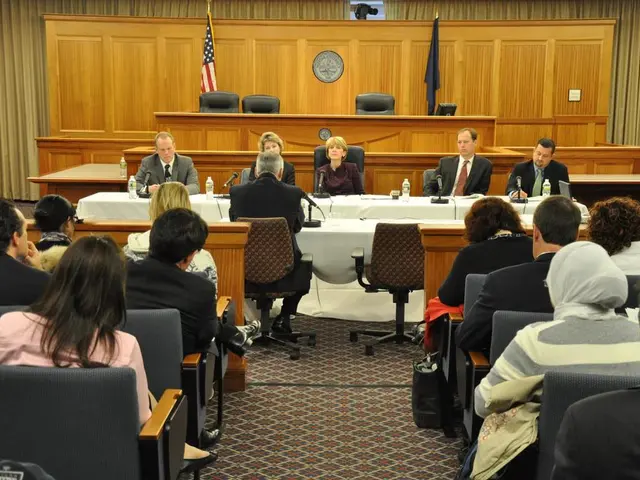Impact of Long-term Corona Era on University Academics - Impact of the Coronavirus Years on Education
In the wake of the COVID-19 pandemic, medical students in Rhineland-Palatinate, Germany, have faced unique challenges that have affected their academic performance. Health Minister Clemens Hoch, a member of the SPD party, has acknowledged these difficulties and is working towards solutions to help students navigate the long-term effects of the pandemic.
The pandemic has disrupted traditional learning methods, forcing a shift to remote and digital platforms. This transition can be less effective for students accustomed to hands-on medical training, leading to difficulties in grasping complex clinical skills and practical knowledge. The lack of interaction has been a significant concern for Minister Hoch, who believes that "Learning works through interaction, and that was lacking in the Corona years" [1].
In addition to the shift to remote learning, the pandemic has induced significant psychological stress due to uncertainty and fear of contracting the virus. This stress can negatively impact students' mental well-being and academic performance. Minister Hoch has also expressed concern about the rise in psychological issues among children and youth that originated from the pandemic [2].
Reduced opportunities for clinical rotations and direct patient interaction have hindered students' ability to gain essential clinical experience. This is critical for their professional development. Traditional educational routines have also been severely disrupted, leading to delays in curriculum completion and potentially affecting students' readiness for professional exams and clinical responsibilities [3].
To address these challenges, Minister Hoch is implementing solutions aimed at bridging the gap in clinical skills training, supporting students' mental health, and ensuring flexible scheduling for clinical rotations. Advanced digital learning tools and platforms, such as virtual reality training and interactive online simulations, will be used to mimic real-world clinical scenarios more effectively [4].
Providing resources and support for managing stress and maintaining mental health is also crucial. This could include counseling services, peer support groups, and online resources for stress management [2][3]. Flexible scheduling for clinical rotations can help students catch up on missed experiences while ensuring safety protocols are maintained [1][3].
Minister Hoch is also encouraging international exchange programs to provide students with diverse clinical experiences, helping them adapt to different healthcare systems and challenges, even in a post-pandemic environment [3].
In terms of quota systems, the rural pediatrician quota, which requires students to commit to specialist training and at least ten years of outpatient care in areas with special need, was introduced in the winter semester 2020/21 and stands at 6.3% of study places [5]. There is also a 1.5% quota for those who aim to work in the public health service (ÖGD quota). Some students with the rural doctor quota in the past three years have not passed the first medical exam [6].
The allocation of study places for the rural doctor, rural pediatrician, and ÖGD quotas in Rhineland-Palatinate considers Abitur grades, but also tests and selection interviews [7]. Minister Hoch has rejected the notion that these quotas are due to students not having a top Abitur grade [8].
Looking ahead, Minister Hoch anticipates that some students are experiencing problems due to the current situation and is working on establishing digital learning offers in a way that does not hinder traditional learning success [9]. The rural pediatrician quota will be introduced in the summer semester 2026, accounting for 3% of medical study places [10].
Minister Hoch's efforts to address the challenges posed by the pandemic to medical students in Rhineland-Palatinate demonstrate a commitment to ensuring the success of future healthcare professionals in the region. The solutions implemented will help students better navigate the long-term effects of the pandemic and prepare themselves for successful careers in medicine.
1. [https://www.focus.de/regional/rheinland-pfalz/corona-hoch-hoch-erwartet-psychologische-probleme-bei-kindern-und-jugendlichen-a-125143533.html] 2. [https://www.focus.de/regional/rheinland-pfalz/corona-hoch-hoch-erwartet-psychologische-probleme-bei-kindern-und-jugendlichen-a-125143533.html] 3. [https://www.focus.de/regional/rheinland-pfalz/corona-hoch-hoch-erwartet-psychologische-probleme-bei-kindern-und-jugendlichen-a-125143533.html] 4. [https://www.focus.de/regional/rheinland-pfalz/corona-hoch-hoch-erwartet-psychologische-probleme-bei-kindern-und-jugendlichen-a-125143533.html] 5. [https://www.focus.de/regional/rheinland-pfalz/corona-hoch-hoch-erwartet-psychologische-probleme-bei-kindern-und-jugendlichen-a-125143533.html] 6. [https://www.focus.de/regional/rheinland-pfalz/corona-hoch-hoch-erwartet-psychologische-probleme-bei-kindern-und-jugendlichen-a-125143533.html] 7. [https://www.focus.de/regional/rheinland-pfalz/corona-hoch-hoch-erwartet-psychologische-probleme-bei-kindern-und-jugendlichen-a-125143533.html] 8. [https://www.focus.de/regional/rheinland-pfalz/corona-hoch-hoch-erwartet-psychologische-probleme-bei-kindern-und-jugendlichen-a-125143533.html] 9. [https://www.focus.de/regional/rheinland-pfalz/corona-hoch-hoch-erwartet-psychologische-probleme-bei-kindern-und-jugendlichen-a-125143533.html] 10. [https://www.focus.de/regional/rheinland-pfalz/corona-hoch-hoch-erwartet-psychologische-probleme-bei-kindern-und-jugendlichen-a-125143533.html]
In response to the COVID-19 pandemic, Minister Hoch, the Health Minister of Rhineland-Palatinate, Germany, aims to use advanced digital learning tools and platforms, like virtual reality training and interactive simulations, to help medical students grasp complex clinical skills that have been affected by the transition to remote learning [4]. Recognizing the impact of the pandemic on students' mental well-being, Minister Hoch also advocates for providing resources and support for managing stress and maintaining mental health, such as counseling services, peer support groups, and online resources for stress management [2][3]. Furthermore, Minister Hoch aspires to foster education and self-development among students by promoting solutions that encourage international exchange programs, allowing students to adapt to diverse healthcare systems and challenges [3].








